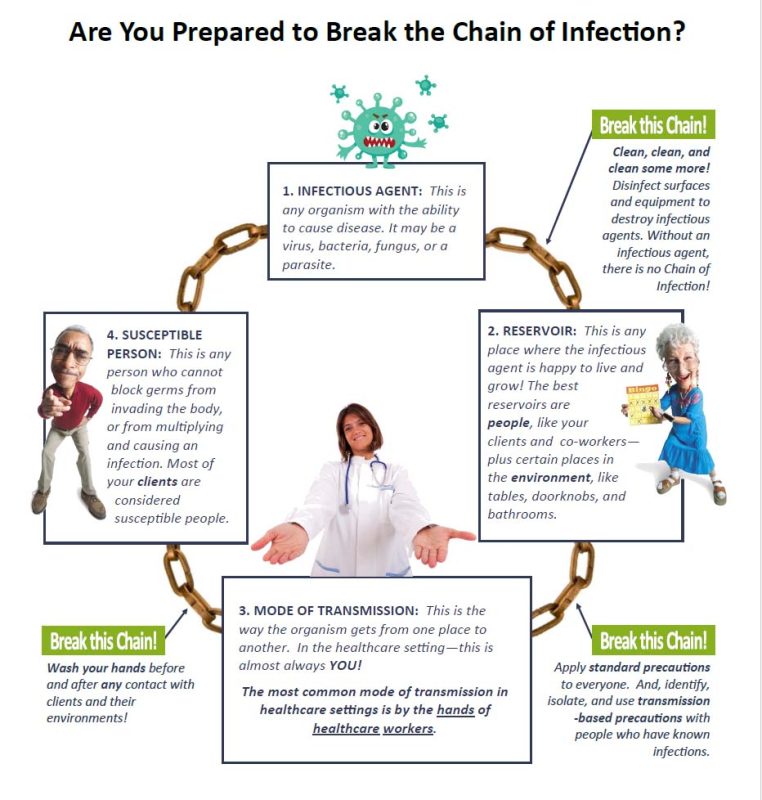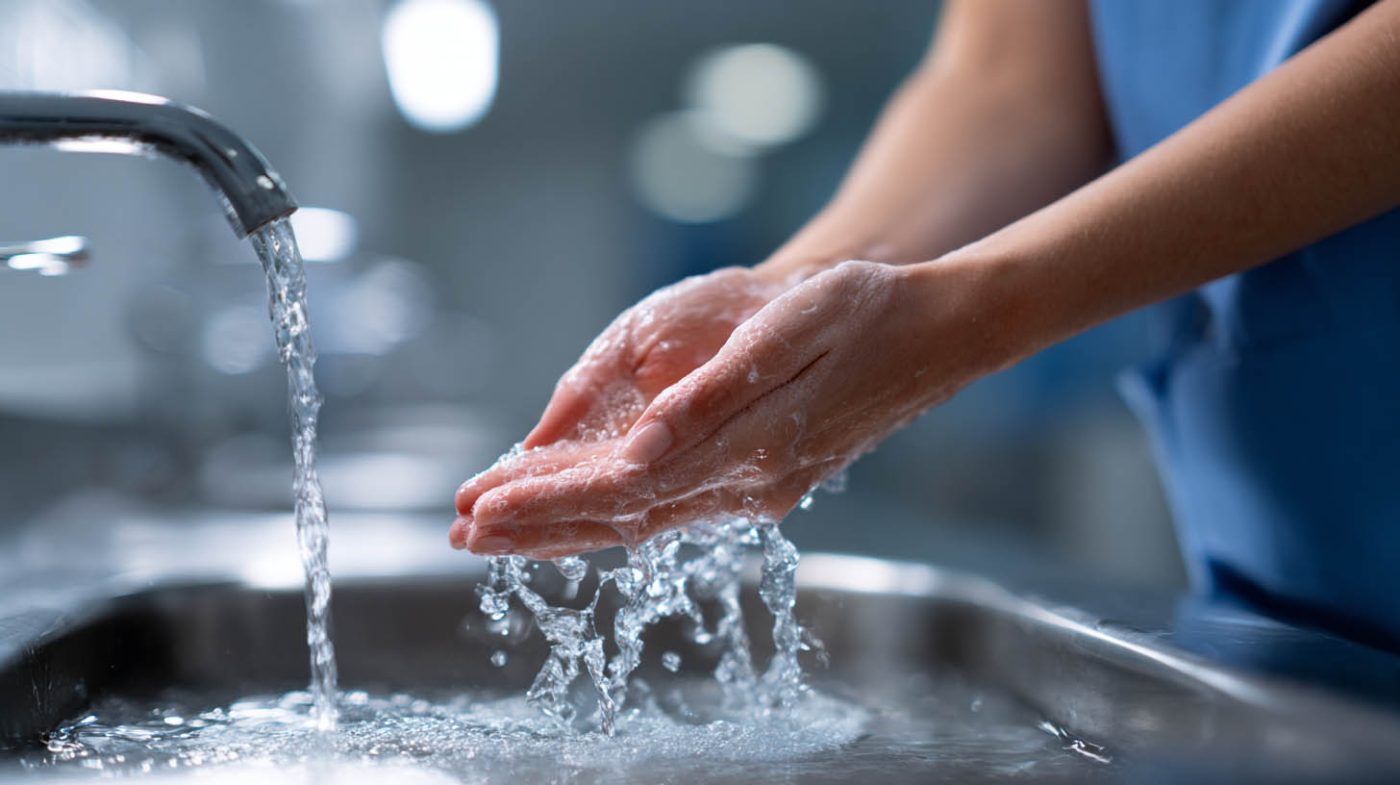Caring at home is intimate, meaningful—and full of high-touch moments where germs can spread. Infections don’t only happen in hospitals; they can develop in home care and long-term care too, which is why solid infection-control habits matter every single day. Proper handwashing is the single most effective way to prevent spread, yet studies show many health workers still don’t wash as often as needed.
Source: Knowing More
What Is Infection Control?
Infection control is the set of everyday practices—hand hygiene, cleaning/disinfection, safe glove use, cough etiquette—that stop germs from moving between people, surfaces, and equipment. In home care, it means using Standard Precautions with every client and adding extra steps when a specific infection is known or suspected.
Why It Matters
Infections don’t just happen in hospitals. They can start at home during routine care. Strong infection-control habits protect seniors with weaker immune systems, keep caregivers healthy, reduce emergency visits, and save families stress and cost. The single most effective step: proper handwashing—done at the right moments, every time.
Fast Facts (Home & Community Care)
- Nearly 99,000 people in the U.S. die each year from healthcare-associated infections (HAIs).
- 80% of infectious diseases are spread by hands.
- You touch about 300 surfaces every 30 minutes, exposing you to roughly 840,000 germs.
- About 3 in 100 home-care clients will develop an HAI without strong prevention.
- HAIs cost the healthcare system around $35 billion annually.
- Most common HAIs: urinary tract infections, surgical site infections, bloodstream infections, pneumonia, C. diff, and MRSA.
- Despite the risks, more than half of healthcare workers don’t wash as often as they should—so building rock-solid hand hygiene at home truly saves lives.
Chain of Infection (4 Links)
What is the “chain of infection”?
A simple model showing how germs move from their source to a person who can get sick. If all four links are present, infection can occur.
Why it’s a chain
Each link depends on the next. When all four connect—germ → place to live → way to spread → susceptible person—the loop keeps going. Break any one link and the infection can’t continue.
How dangerous this loop is
In care settings, the loop often runs through caregivers’ hands—the most common mode of transmission in healthcare. If unbroken, one infection can quickly spread to multiple people.

The 4 Links
- Infectious Agent
Any organism that can cause disease (virus, bacteria, fungus, parasite). - Reservoir
Any place the germ lives and grows. Top reservoirs are people (clients, co-workers) and environmental spots like tables, doorknobs, and bathrooms. - Mode of Transmission
How germs travel from place to place—most commonly via the hands of healthcare workers. - Susceptible Person
Anyone who cannot effectively block germs from entering or multiplying. Most clients are considered susceptible.
How to Break the Chain
- Knock out the agent: “Clean, clean, and clean some more!” Disinfect surfaces and equipment—no agent, no chain.
- Stop transmission: Wash your hands before and after any contact with clients or their environment.
- Protect the susceptible: Apply Standard Precautions to everyone. For known infections, identify, isolate, and use transmission-based precautions.
Smart About Germ
What’s on Your Hands?
- Healthcare workers can carry up to 500,000 bacteria per square centimeter on their hands.
- Hands can pass along many germs that cause illness, including: common cold, herpes simplex (cold sores), mono, pink eye, RSV, MRSA (antibiotic-resistant staph), strep throat, scarlet fever, yeast infections, scabies, lice, infectious diarrhea, ringworm, norovirus, hand-foot-mouth disease, viral meningitis, salmonella (food poisoning), thrush, and warts.
When Should You Wash Your Hands?
Hand sanitizer is handy, but not always enough—sometimes soap and water are the only option. Wash your hands:
- Before and after you eat or use the bathroom.
- After touching contaminated items (e.g., urine measuring devices).
- Before putting on and after removing gloves.
- Any time a client asks you to wash your hands.
- Whenever preparing food for a client.
- After sneezing or coughing, even if you used a tissue.
Are All Germs Bad?
- Resident flora: Normal bacteria that live on everyone’s skin. Usually not harmful (often helpful) and attach to deeper skin layers, so they’re harder to wash off.
- Transient flora: “Just visiting” germs picked up from people or objects. They sit on the outer skin, are removed by routine handwashing, and are the ones most likely to cause illness.
Summary
- Chain of Infection (4 links): germ → reservoir → transmission (often hands) → susceptible person.
- Core controls: wash hands at key moments, clean/disinfect high-touch surfaces and shared equipment, use the right PPE for tasks, cover coughs/wounds, and encourage vaccines/healthy habits.
- Goal: break any one link to stop the loop and protect seniors at home.
Final Advice
- Make hand hygiene automatic: before/after client contact, bathroom help, food prep, gloves on/off.
- Keep a cleaning caddy ready; wipe rails, remotes, phones, walkers daily.
- Use Standard Precautions with everyone; add extra steps for known infections.
- Act early on symptoms (new cough, fever, confusion, diarrhea)—call the clinician or 911 for red flags.
Disclaimer
Medical Disclaimer: This material is for general education only and not a substitute for professional medical advice, diagnosis, or treatment. Always follow your clinician’s guidance and your agency’s infection-control policies. If severe or worsening symptoms occur—such as trouble breathing, chest pain, new confusion, or dehydration—call 911 or go to the nearest emergency department.
- “The Climb” Hits Drohan Apartments: Scaling the Leaderboard in the Battle of the Buildings!
- DASH Diet for Seniors: A Simple Guide to Lowering Blood Pressure
- Warm Hearts in a Snowstorm: The Quincy BP Challenge Hits Tobin Tower
- Common Diabetes Symptoms in Seniors: What to Watch For
- The A1C Test: Understanding Your “Big Picture” Health


